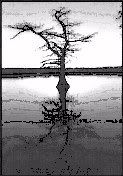DE PONDERINGS
By Kevin Kessler, District Executive
 (Read Jeremiah 17)
(Read Jeremiah 17)
Chapter 17 of Jeremiah begins with the prophet making a bold statement that sin leaves indelible marks. Future generations will see and know the sins of past generations. Subsequent generations may even accept sins of the past as normal. Jeremiah intends for the present generation to understand this and find a way of living that will be remembered and followed differently.
Reflecting upon 2008, I’m reminded that Jeremiah’s message has received minimal attention in our modern context. The present generation is leaving some indelible markings that are not befitting of emulation by future generations, namely a preoccupation with things that we own or things we want to own. One word has the ability to summarize this present human malady—greed. Granted, I’m oversimplifying what is a more complex problem. However, greed seems to play an important role—from CEOs of major corporations receiving enormous salaries and bonuses; to consumers borrowing excessively to purchase homes with more square footage and vehicles with bigger gas tanks; to retailers giving deep discounts to lure zealous consumers; to the government issuing stimulus packages to boost spending rather than savings.
Greed is just one way of saying that things receive greater importance than God. Jeremiah claims that trusting in anything other than God leaves us “like a shrub in the desert” living “in the parched places of the wilderness, in an uninhabited salt land.” This description provides little if any hope. It is a less than desirable indelible message to leave to our children and our childrens’ children.
Jeremiah offers a prescription that brings wellness to this pandemic human condition—“trust in the Lord,” or better yet, let the Lord be your trust. Allowing God to become our trust gives us freedom from the things that ensnare us. An attitude adjustment occurs whereby the concern for gaining or owning things shifts to learning how to share and give things away in obedience to God and for the benefit of all. Jeremiah captures the image this way: “They shall be like a tree planted by water, sending out its roots by the stream…it’s leaves shall stay green…”
To make God our trust, the need to acquire or keep is vanquished. God is the supply and will keep one sustained always.
Does this mean we’ll always have what we want? No. But it does allow us to believe that we’ll have what we need.
Ponder this quote from Albert Schweitzer: “If there is something that you own that you cannot give away, you don’t own it. It owns you.”
Reflect also on Mark 10:17-22.
What indelible mark are we leaving for future generations? Together, let’s give this question consideration in 2009.
 (Read Jeremiah 17)
(Read Jeremiah 17)Chapter 17 of Jeremiah begins with the prophet making a bold statement that sin leaves indelible marks. Future generations will see and know the sins of past generations. Subsequent generations may even accept sins of the past as normal. Jeremiah intends for the present generation to understand this and find a way of living that will be remembered and followed differently.
Reflecting upon 2008, I’m reminded that Jeremiah’s message has received minimal attention in our modern context. The present generation is leaving some indelible markings that are not befitting of emulation by future generations, namely a preoccupation with things that we own or things we want to own. One word has the ability to summarize this present human malady—greed. Granted, I’m oversimplifying what is a more complex problem. However, greed seems to play an important role—from CEOs of major corporations receiving enormous salaries and bonuses; to consumers borrowing excessively to purchase homes with more square footage and vehicles with bigger gas tanks; to retailers giving deep discounts to lure zealous consumers; to the government issuing stimulus packages to boost spending rather than savings.
Greed is just one way of saying that things receive greater importance than God. Jeremiah claims that trusting in anything other than God leaves us “like a shrub in the desert” living “in the parched places of the wilderness, in an uninhabited salt land.” This description provides little if any hope. It is a less than desirable indelible message to leave to our children and our childrens’ children.
Jeremiah offers a prescription that brings wellness to this pandemic human condition—“trust in the Lord,” or better yet, let the Lord be your trust. Allowing God to become our trust gives us freedom from the things that ensnare us. An attitude adjustment occurs whereby the concern for gaining or owning things shifts to learning how to share and give things away in obedience to God and for the benefit of all. Jeremiah captures the image this way: “They shall be like a tree planted by water, sending out its roots by the stream…it’s leaves shall stay green…”
To make God our trust, the need to acquire or keep is vanquished. God is the supply and will keep one sustained always.
Does this mean we’ll always have what we want? No. But it does allow us to believe that we’ll have what we need.
Ponder this quote from Albert Schweitzer: “If there is something that you own that you cannot give away, you don’t own it. It owns you.”
Reflect also on Mark 10:17-22.
What indelible mark are we leaving for future generations? Together, let’s give this question consideration in 2009.

<< Home